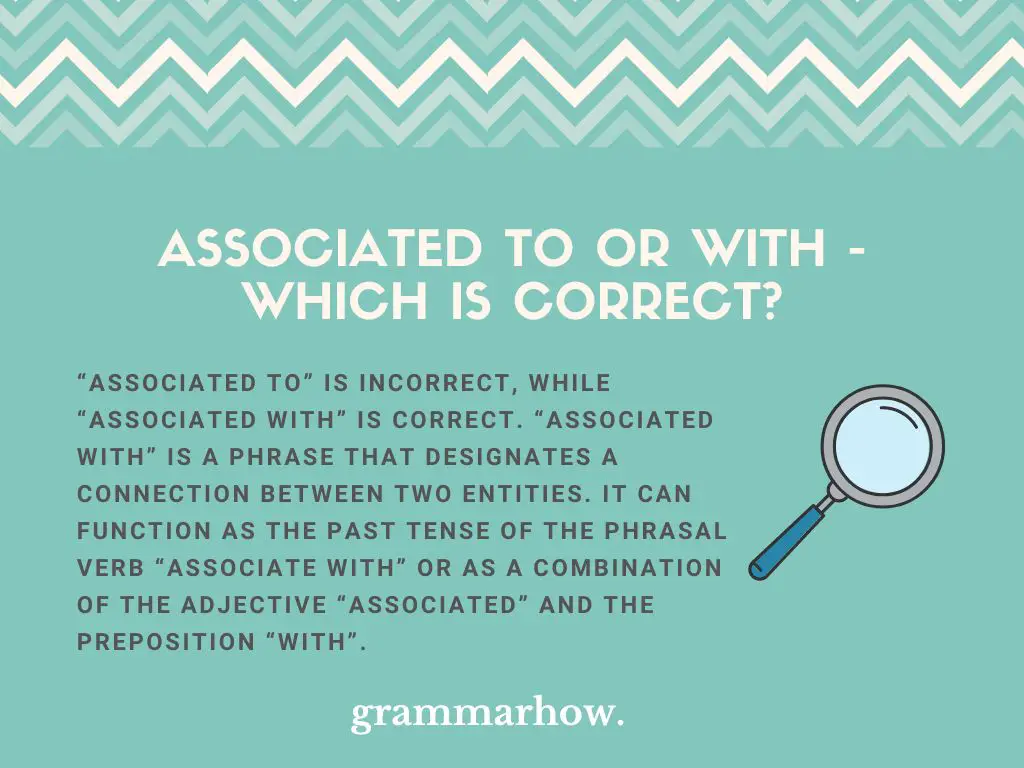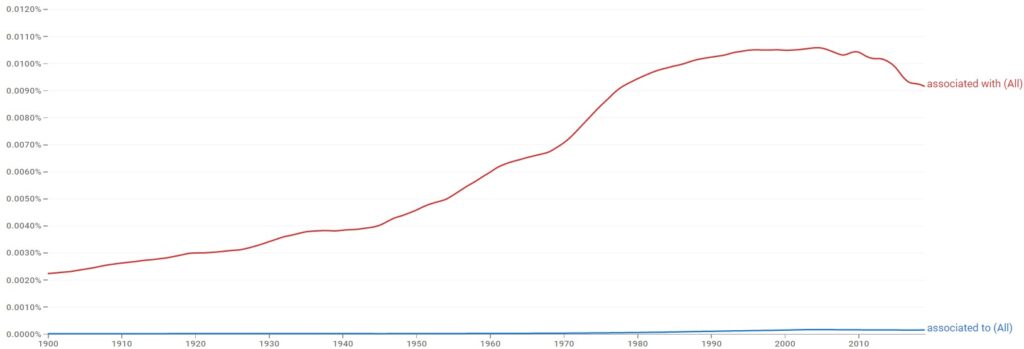Remember that time you fell over at school at everyone called you DJ Trippy for a month? Yeah, me neither… there are things that people will connect with you, whether you want them to or not.
But are you associated to them or associated with them?
Associated To or With – Which Is Correct?
“Associated to” is incorrect, while “associated with” is correct. “Associated with” is a phrase that designates a connection between two entities. It can function as the past tense of the phrasal verb “associate with” or as a combination of the adjective “associated” and the preposition “with”.

A phrasal verb occurs when a verb combines with an adverb or preposition to create a new meaning. On its own, to “associate” means to draw a connection between two things in your mind. To “associate with” is to interact with a group or person.
We’ll be diving more into what “associated with” means, both as a phrasal verb and as an adjective, later on in this article.
Associated To
“Associated to” is an incorrect variation of the phrase “associated with”. It isn’t grammatically correct and should be avoided at all costs. Well, probably not at all costs, but you get our point.
The confusion around whether the phrase is “associated with” or “associated to” might stem from translation issues. In Romance languages, the translation for “associate” is paired with the equivalent for “to” rather than “with”.
“Associated to” has become one of those phrases that pop up from time to time, and, if you see it around, it might not immediately register as incorrect. It is incorrect though, so don’t use it.
Let’s look at some examples of how not to use “associated to” in a sentence:
- Incorrect: I can’t believe I ever associated to those people!
- Incorrect: I can’t believe I was ever associated to that company!
In the first sentence, “associated to” is used as the past participle of the phrasal verb “associate with”, which means to interact with a person or group. In the second, “associated” is used as an adjective, which means “connected”. In both, “to” has no business being there.
Let’s try a couple more examples just so we can see exactly what not to do:
- Incorrect: The thought that anyone has ever associated me to you is absolutely horrifying.
- Incorrect: This pattern can be associated to the increase of carbon dioxide in our atmosphere.
- Incorrect: I associated to them once, but I was young and foolish back then.
Associated With
“Associated with” is either the past participle of the phrasal verb “associate with” or a combination of the adjective “associated” and the preposition “with”.
The Cambridge Dictionary defines the adjective “associated” as “connected”. So, to be “associated with” something is to be connected to it in some way.
It defines “associate with” as “to spend time with a group of people, especially people who are disapproved of”.
So, if you “associated with” someone, that means that you used to spend time with them, but you don’t anymore. If you are “associated with” something, that means there is currently a connection between you and that thing.
Does that make sense? Don’t worry if you don’t get it just yet. We have some handy example sentences below to help you figure it out.
- Robert Pattison will forever be associated with the Twilight franchise, no matter how hard he tries to escape it.
- I associated with lawyers before, but now I associate with criminals, and I’m much happier.
- Overworking and stress are associated with heart conditions and reduced life expectancy.
- I want to be associated with class and elegance, but I can’t stop burping and falling over.
“Associated with” can also be swapped with “associated to” in all of our previous examples to turn them into lovely, grammatically correct sentences.
Which Is Used the Most?
As expected, the correct variant “associated with” is used much more than the incorrect “associated to”.
If we take a look at the trusty Google Ngram Viewer, we can see that “associated to” barely appeared at all prior to the 1990s. Since then, it has experienced a slight uptick in use. However, its appearances are still negligible in comparison to “associated with”.

The odds of it catching on? We think low.
Final Thoughts
“Associated to” is an incorrect variation of the phrase “associated with”, possibly stemming from translation errors. It isn’t grammatical and shouldn’t be used. “Associated with” can be used as either the past participle of “associate with” or as the adjective “associated” and the preposition “with”.

Martin holds a Master’s degree in Finance and International Business. He has six years of experience in professional communication with clients, executives, and colleagues. Furthermore, he has teaching experience from Aarhus University. Martin has been featured as an expert in communication and teaching on Forbes and Shopify. Read more about Martin here.
